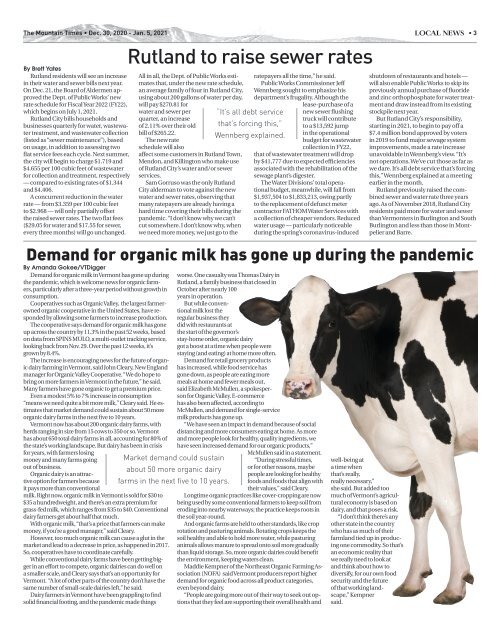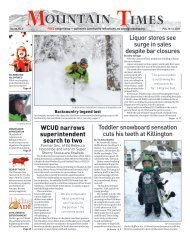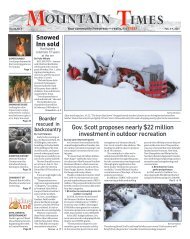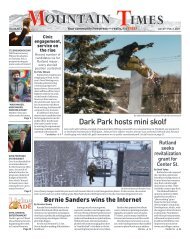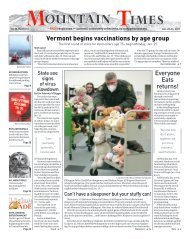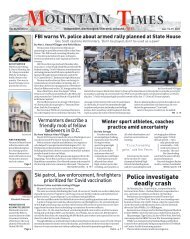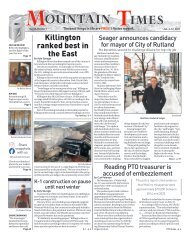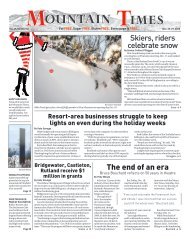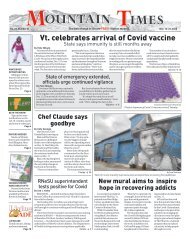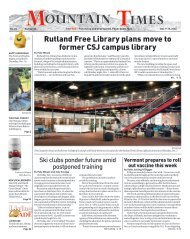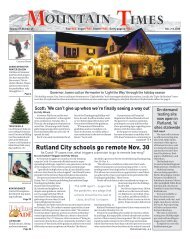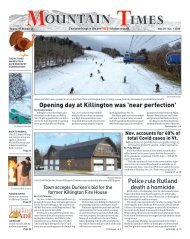Mountain Times - Vol. 49, No. 53 - Dec. 30, 2020 - Jan 2, 2021
Create successful ePaper yourself
Turn your PDF publications into a flip-book with our unique Google optimized e-Paper software.
The <strong>Mountain</strong> <strong>Times</strong> • <strong>Dec</strong>. <strong>30</strong>, <strong>2020</strong> - <strong>Jan</strong>. 5, <strong>2021</strong> LOCAL NEWS • 3<br />
By Brett Yates<br />
Rutland residents will see an increase<br />
in their water and sewer bills next year.<br />
On <strong>Dec</strong>. 21, the Board of Aldermen approved<br />
the Dept. of Public Works’ new<br />
rate schedule for Fiscal Year 2022 (FY22),<br />
which begins on July 1, <strong>2021</strong>.<br />
Rutland City bills households and<br />
businesses quarterly for water, wastewater<br />
treatment, and wastewater collection<br />
(listed as “sewer maintenance”), based<br />
on usage, in addition to assessing two<br />
flat service fees each cycle. Next summer,<br />
the city will begin to charge $1.719 and<br />
$4.655 per 100 cubic feet of wastewater<br />
for collection and treatment, respectively<br />
— compared to existing rates of $1.344<br />
and $4.406.<br />
A concurrent reduction in the water<br />
rate — from $3.359 per 100 cubic feet<br />
to $2.968 — will only partially offset<br />
the raised sewer rates. The two flat fees<br />
($29.05 for water and $17.55 for sewer,<br />
every three months) will go unchanged.<br />
By Amanda Gokee/VTDigger<br />
Demand for organic milk in Vermont has gone up during<br />
the pandemic, which is welcome news for organic farmers,<br />
particularly after a three-year period without growth in<br />
consumption.<br />
Cooperatives such as Organic Valley, the largest farmerowned<br />
organic cooperative in the United States, have responded<br />
by allowing some farmers to increase production.<br />
The cooperative says demand for organic milk has gone<br />
up across the country by 11.3% in the past 52 weeks, based<br />
on data from SPINS MULO, a multi-outlet tracking service,<br />
looking back from <strong>No</strong>v. 29. Over the past 12 weeks, it’s<br />
grown by 8.4%.<br />
The increase is encouraging news for the future of organic<br />
dairy farming in Vermont, said John Cleary, New England<br />
manager for Organic Valley Cooperative. “We do hope to<br />
bring on more farmers in Vermont in the future,” he said.<br />
Many farmers have gone organic to get a premium price.<br />
Even a modest 5% to 7% increase in consumption<br />
“means we need quite a bit more milk,” Cleary said. He estimates<br />
that market demand could sustain about 50 more<br />
organic dairy farms in the next five to 10 years.<br />
Vermont now has about 200 organic dairy farms, with<br />
herds ranging in size from 15 cows to 350 or so. Vermont<br />
has about 650 total dairy farms in all, accounting for 80% of<br />
the state’s working landscape. But dairy has been in crisis<br />
for years, with farmers losing<br />
money and many farms going<br />
out of business.<br />
Organic dairy is an attractive<br />
option for farmers because<br />
it pays more than conventional<br />
milk. Right now, organic milk in Vermont is sold for $<strong>30</strong> to<br />
$35 a hundredweight, and there’s an extra premium for<br />
grass-fed milk, which ranges from $35 to $40. Conventional<br />
dairy farmers get about half that much.<br />
With organic milk, “that’s a price that farmers can make<br />
money, if you’re a good manager,” said Cleary.<br />
However, too much organic milk can cause a glut in the<br />
market and lead to a decrease in price, as happened in 2017.<br />
So, cooperatives have to coordinate carefully.<br />
While conventional dairy farms have been getting bigger<br />
in an effort to compete, organic dairies can do well on<br />
a smaller scale, and Cleary says that’s an opportunity for<br />
Vermont. “A lot of other parts of the country don’t have the<br />
same number of small-scale dairies left,” he said.<br />
Dairy farmers in Vermont have been grappling to find<br />
solid financial footing, and the pandemic made things<br />
Rutland to raise sewer rates<br />
All in all, the Dept. of Public Works estimates<br />
that, under the new rate schedule,<br />
an average family of four in Rutland City,<br />
using about 200 gallons of water per day,<br />
will pay $270.81 for<br />
water and sewer per<br />
quarter, an increase<br />
of 2.11% over their old<br />
bill of $265.22.<br />
The new rate<br />
schedule will also<br />
affect some customers in Rutland Town,<br />
Mendon, and Killington who make use<br />
of Rutland City’s water and/or sewer<br />
services.<br />
Sam Gorruso was the only Rutland<br />
City alderman to vote against the new<br />
water and sewer rates, observing that<br />
many ratepayers are already having a<br />
hard time covering their bills during the<br />
pandemic. “I don’t know why we can’t<br />
cut somewhere. I don’t know why, when<br />
we need more money, we just go to the<br />
“It’s all debt service<br />
that’s forcing this,”<br />
Wennberg explained.<br />
ratepayers all the time,” he said.<br />
Public Works Commissioner Jeff<br />
Wennberg sought to emphasize his<br />
department’s frugality. Although the<br />
lease-purchase of a<br />
new sewer flushing<br />
truck will contribute<br />
to a $13,592 jump<br />
in the operational<br />
budget for wastewater<br />
collection in FY22,<br />
that of wastewater treatment will drop<br />
by $41,777 due to expected efficiencies<br />
associated with the rehabilitation of the<br />
sewage plant’s digester.<br />
The Water Divisions’ total operational<br />
budget, meanwhile, will fall from<br />
$1,937,504 to $1,833,213, owing partly<br />
to the replacement of defunct meter<br />
contractor FATHOM Water Services with<br />
a collection of cheaper vendors. Reduced<br />
water usage — particularly noticeable<br />
during the spring’s coronavirus-induced<br />
worse. One casualty was Thomas Dairy in<br />
Rutland, a family business that closed in<br />
October after nearly 100<br />
years in operation.<br />
But while conventional<br />
milk lost the<br />
regular business they<br />
did with restaurants at<br />
the start of the governor’s<br />
stay-home order, organic dairy<br />
got a boost at a time when people were<br />
staying (and eating) at home more often.<br />
Demand for retail grocery products<br />
has increased, while food service has<br />
gone down, as people are eating more<br />
meals at home and fewer meals out,<br />
said Elizabeth McMullen, a spokesperson<br />
for Organic Valley. E-commerce<br />
has also been affected, according to<br />
McMullen, and demand for single-service<br />
milk products has gone up.<br />
“We have seen an impact in demand because of social<br />
distancing and more consumers eating at home. As more<br />
and more people look for healthy, quality ingredients, we<br />
have seen increased demand for our organic products,”<br />
McMullen said in a statement.<br />
“During stressful times,<br />
or for other reasons, maybe<br />
people are looking for healthy<br />
foods and foods that align with<br />
their values,” said Cleary.<br />
Longtime organic practices like cover-cropping are now<br />
being used by some conventional farmers to keep soil from<br />
eroding into nearby waterways; the practice keeps roots in<br />
the soil year-round.<br />
And organic farms are held to other standards, like crop<br />
rotation and pasturing animals. Rotating crops keeps the<br />
soil healthy and able to hold more water, while pasturing<br />
animals allows manure to spread onto soil more gradually<br />
than liquid storage. So, more organic dairies could benefit<br />
the environment, keeping waters clean.<br />
Maddie Kempner of the <strong>No</strong>rtheast Organic Farming Association<br />
(NOFA) said Vermont producers report higher<br />
demand for organic food across all product categories,<br />
even beyond dairy.<br />
“People are going more out of their way to seek out options<br />
that they feel are supporting their overall health and<br />
well-being at<br />
a time when<br />
that’s really,<br />
really necessary,”<br />
she said. But added too<br />
much of Vermont’s agricultural<br />
economy is based on<br />
dairy, and that poses a risk.<br />
“I don’t think there’s any<br />
other state in the country<br />
who has as much of their<br />
farmland tied up in producing<br />
one commodity. So that’s<br />
an economic reality that<br />
we really need to look at<br />
and think about how to<br />
diversify, for our own food<br />
security and the future<br />
of that working landscape,”<br />
Kempner<br />
said.<br />
shutdown of restaurants and hotels —<br />
will also enable Public Works to skip its<br />
previously annual purchase of fluoride<br />
and zinc orthophosphate for water treatment<br />
and draw instead from its existing<br />
stockpile next year.<br />
But Rutland City’s responsibility,<br />
starting in <strong>2021</strong>, to begin to pay off a<br />
$7.4 million bond approved by voters<br />
in 2019 to fund major sewage system<br />
improvements, made a rate increase<br />
unavoidable in Wennberg’s view. “It’s<br />
not operations. We’ve cut those as far as<br />
we dare. It’s all debt service that’s forcing<br />
this,” Wennberg explained at a meeting<br />
earlier in the month.<br />
Rutland previously raised the combined<br />
sewer and water rate three years<br />
ago. As of <strong>No</strong>vember 2018, Rutland City<br />
residents paid more for water and sewer<br />
than Vermonters in Burlington and South<br />
Burlington and less than those in Montpelier<br />
and Barre.<br />
Demand for organic milk has gone up during the pandemic<br />
Market demand could sustain<br />
about 50 more organic dairy<br />
farms in the next five to 10 years.


